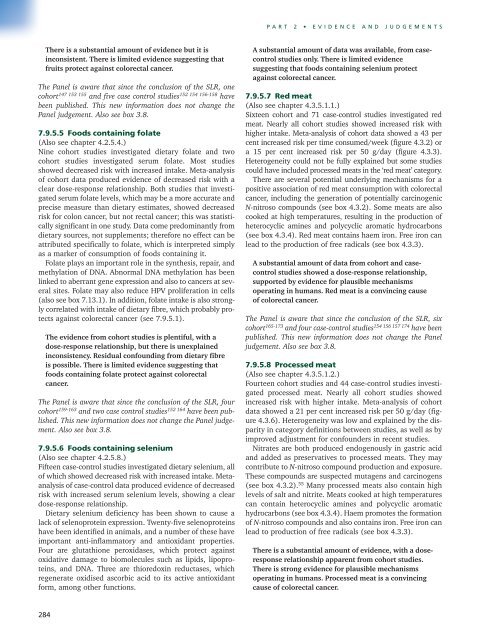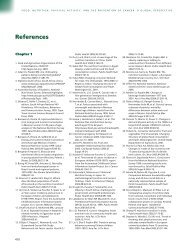Full Report - Food, Nutrition, and the Prevention of Cancer
Full Report - Food, Nutrition, and the Prevention of Cancer
Full Report - Food, Nutrition, and the Prevention of Cancer
You also want an ePaper? Increase the reach of your titles
YUMPU automatically turns print PDFs into web optimized ePapers that Google loves.
There is a substantial amount <strong>of</strong> evidence but it is<br />
inconsistent. There is limited evidence suggesting that<br />
fruits protect against colorectal cancer.<br />
The Panel is aware that since <strong>the</strong> conclusion <strong>of</strong> <strong>the</strong> SLR, one<br />
cohort 147 153 155 <strong>and</strong> five case control studies 152 154 156-158 have<br />
been published. This new information does not change <strong>the</strong><br />
Panel judgement. Also see box 3.8.<br />
7.9.5.5 <strong>Food</strong>s containing folate<br />
(Also see chapter 4.2.5.4.)<br />
Nine cohort studies investigated dietary folate <strong>and</strong> two<br />
cohort studies investigated serum folate. Most studies<br />
showed decreased risk with increased intake. Meta-analysis<br />
<strong>of</strong> cohort data produced evidence <strong>of</strong> decreased risk with a<br />
clear dose-response relationship. Both studies that investigated<br />
serum folate levels, which may be a more accurate <strong>and</strong><br />
precise measure than dietary estimates, showed decreased<br />
risk for colon cancer, but not rectal cancer; this was statistically<br />
significant in one study. Data come predominantly from<br />
dietary sources, not supplements; <strong>the</strong>refore no effect can be<br />
attributed specifically to folate, which is interpreted simply<br />
as a marker <strong>of</strong> consumption <strong>of</strong> foods containing it.<br />
Folate plays an important role in <strong>the</strong> syn<strong>the</strong>sis, repair, <strong>and</strong><br />
methylation <strong>of</strong> DNA. Abnormal DNA methylation has been<br />
linked to aberrant gene expression <strong>and</strong> also to cancers at several<br />
sites. Folate may also reduce HPV proliferation in cells<br />
(also see box 7.13.1). In addition, folate intake is also strongly<br />
correlated with intake <strong>of</strong> dietary fibre, which probably protects<br />
against colorectal cancer (see 7.9.5.1).<br />
The evidence from cohort studies is plentiful, with a<br />
dose-response relationship, but <strong>the</strong>re is unexplained<br />
inconsistency. Residual confounding from dietary fibre<br />
is possible. There is limited evidence suggesting that<br />
foods containing folate protect against colorectal<br />
cancer.<br />
The Panel is aware that since <strong>the</strong> conclusion <strong>of</strong> <strong>the</strong> SLR, four<br />
cohort 159-163 <strong>and</strong> two case control studies 152 164 have been published.<br />
This new information does not change <strong>the</strong> Panel judgement.<br />
Also see box 3.8.<br />
7.9.5.6 <strong>Food</strong>s containing selenium<br />
(Also see chapter 4.2.5.8.)<br />
Fifteen case-control studies investigated dietary selenium, all<br />
<strong>of</strong> which showed decreased risk with increased intake. Metaanalysis<br />
<strong>of</strong> case-control data produced evidence <strong>of</strong> decreased<br />
risk with increased serum selenium levels, showing a clear<br />
dose-response relationship.<br />
Dietary selenium deficiency has been shown to cause a<br />
lack <strong>of</strong> selenoprotein expression. Twenty-five selenoproteins<br />
have been identified in animals, <strong>and</strong> a number <strong>of</strong> <strong>the</strong>se have<br />
important anti-inflammatory <strong>and</strong> antioxidant properties.<br />
Four are glutathione peroxidases, which protect against<br />
oxidative damage to biomolecules such as lipids, lipoproteins,<br />
<strong>and</strong> DNA. Three are thioredoxin reductases, which<br />
regenerate oxidised ascorbic acid to its active antioxidant<br />
form, among o<strong>the</strong>r functions.<br />
284<br />
P ART 2 • EVIDENCE AND JUDGEMENTS<br />
A substantial amount <strong>of</strong> data was available, from casecontrol<br />
studies only. There is limited evidence<br />
suggesting that foods containing selenium protect<br />
against colorectal cancer.<br />
7.9.5.7 Red meat<br />
(Also see chapter 4.3.5.1.1.)<br />
Sixteen cohort <strong>and</strong> 71 case-control studies investigated red<br />
meat. Nearly all cohort studies showed increased risk with<br />
higher intake. Meta-analysis <strong>of</strong> cohort data showed a 43 per<br />
cent increased risk per time consumed/week (figure 4.3.2) or<br />
a 15 per cent increased risk per 50 g/day (figure 4.3.3).<br />
Heterogeneity could not be fully explained but some studies<br />
could have included processed meats in <strong>the</strong> ‘red meat’ category.<br />
There are several potential underlying mechanisms for a<br />
positive association <strong>of</strong> red meat consumption with colorectal<br />
cancer, including <strong>the</strong> generation <strong>of</strong> potentially carcinogenic<br />
N-nitroso compounds (see box 4.3.2). Some meats are also<br />
cooked at high temperatures, resulting in <strong>the</strong> production <strong>of</strong><br />
heterocyclic amines <strong>and</strong> polycyclic aromatic hydrocarbons<br />
(see box 4.3.4). Red meat contains haem iron. Free iron can<br />
lead to <strong>the</strong> production <strong>of</strong> free radicals (see box 4.3.3).<br />
A substantial amount <strong>of</strong> data from cohort <strong>and</strong> casecontrol<br />
studies showed a dose-response relationship,<br />
supported by evidence for plausible mechanisms<br />
operating in humans. Red meat is a convincing cause<br />
<strong>of</strong> colorectal cancer.<br />
The Panel is aware that since <strong>the</strong> conclusion <strong>of</strong> <strong>the</strong> SLR, six<br />
cohort 165-173 <strong>and</strong> four case-control studies 154 156 157 174 have been<br />
published. This new information does not change <strong>the</strong> Panel<br />
judgement. Also see box 3.8.<br />
7.9.5.8 Processed meat<br />
(Also see chapter 4.3.5.1.2.)<br />
Fourteen cohort studies <strong>and</strong> 44 case-control studies investigated<br />
processed meat. Nearly all cohort studies showed<br />
increased risk with higher intake. Meta-analysis <strong>of</strong> cohort<br />
data showed a 21 per cent increased risk per 50 g/day (figure<br />
4.3.6). Heterogeneity was low <strong>and</strong> explained by <strong>the</strong> disparity<br />
in category definitions between studies, as well as by<br />
improved adjustment for confounders in recent studies.<br />
Nitrates are both produced endogenously in gastric acid<br />
<strong>and</strong> added as preservatives to processed meats. They may<br />
contribute to N-nitroso compound production <strong>and</strong> exposure.<br />
These compounds are suspected mutagens <strong>and</strong> carcinogens<br />
(see box 4.3.2). 55 Many processed meats also contain high<br />
levels <strong>of</strong> salt <strong>and</strong> nitrite. Meats cooked at high temperatures<br />
can contain heterocyclic amines <strong>and</strong> polycyclic aromatic<br />
hydrocarbons (see box 4.3.4). Haem promotes <strong>the</strong> formation<br />
<strong>of</strong> N-nitroso compounds <strong>and</strong> also contains iron. Free iron can<br />
lead to production <strong>of</strong> free radicals (see box 4.3.3).<br />
There is a substantial amount <strong>of</strong> evidence, with a doseresponse<br />
relationship apparent from cohort studies.<br />
There is strong evidence for plausible mechanisms<br />
operating in humans. Processed meat is a convincing<br />
cause <strong>of</strong> colorectal cancer.



